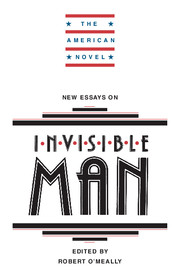Book contents
- Frontmatter
- Contents
- Series Editor's Preface
- 1 Introduction
- 2 The Meaning of Narration in Invisible Man
- 3 Frequencies of Eloquence: The Performance and Composition of Invisible Man
- 4 Ralph Waldo Ellison: Anthropology, Modernism, and Jazz
- 5 Ellison's Masks and the Novel of Reality
- 6 The Conscious Hero and the Rites of Man: Ellison's War
- Notes on Contributors
- Selected Bibliography
6 - The Conscious Hero and the Rites of Man: Ellison's War
Published online by Cambridge University Press: 05 June 2012
- Frontmatter
- Contents
- Series Editor's Preface
- 1 Introduction
- 2 The Meaning of Narration in Invisible Man
- 3 Frequencies of Eloquence: The Performance and Composition of Invisible Man
- 4 Ralph Waldo Ellison: Anthropology, Modernism, and Jazz
- 5 Ellison's Masks and the Novel of Reality
- 6 The Conscious Hero and the Rites of Man: Ellison's War
- Notes on Contributors
- Selected Bibliography
Summary
The psychogenesis of Invisible Man, Ralph Ellison has reiterated periodically, lies in a World War II furlough's tonic state of “hyperreceptivity”: Sent home from the Merchant Marines in the winter of 1944 to recuperate from wartime stress, Ellison had “floundered” into a powerful intuition. With the aesthetic conviction that “war could, with art, be transformed into something more meaningful than its surface violence” (IM p. xiv), he had begun work on a recalcitrant war novel. That work was subverted, he says, by a punning inner voice that brooded over the perennial conundrum of black soldiers fighting for the right to fight for freedom in a war designed to return them home unfree. The voice announced irrepressibly, “I am an invisible man.” Its words rebutted sharply the sociological truism that most Afro-American troubles sprang from the group's “high visibility,” and spurred Ellison to abandon his planned war novel for a highly experimental, panoramic, and picaresque fictional “memoir.” The new work concerned itself more broadly “with the nature of leadership, and thus with the nature of the hero … [and] with the question of just why our Negro leadership was never able to enforce its will. Just what was there about American society that kept Negroes from throwing up effective leaders?” Absorbed at the same moment with Lord Raglan's The Hero: A Study in Tradition, Myth, and Drama (1936), Ellison turned his explorations into modern myth, mores, and caste codes to the specific subject of American “race rituals.”
- Type
- Chapter
- Information
- New Essays on Invisible Man , pp. 157 - 186Publisher: Cambridge University PressPrint publication year: 1988
- 1
- Cited by



